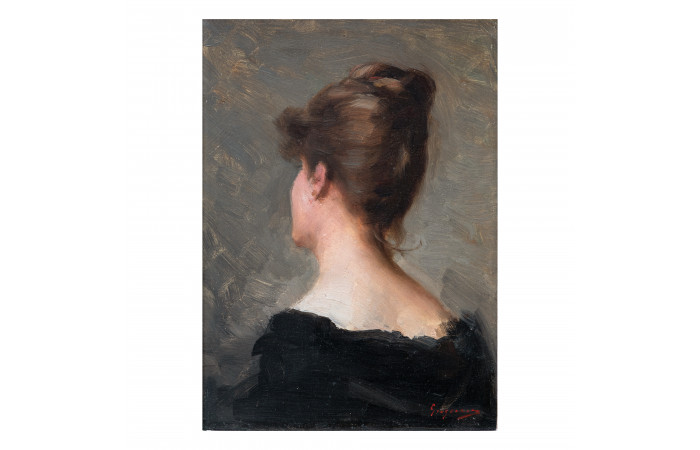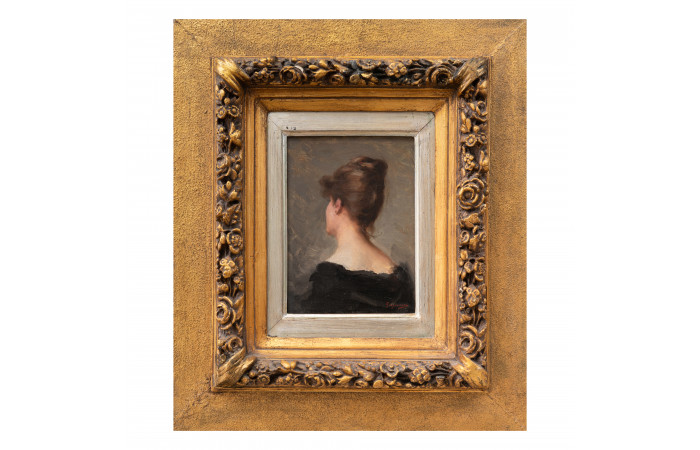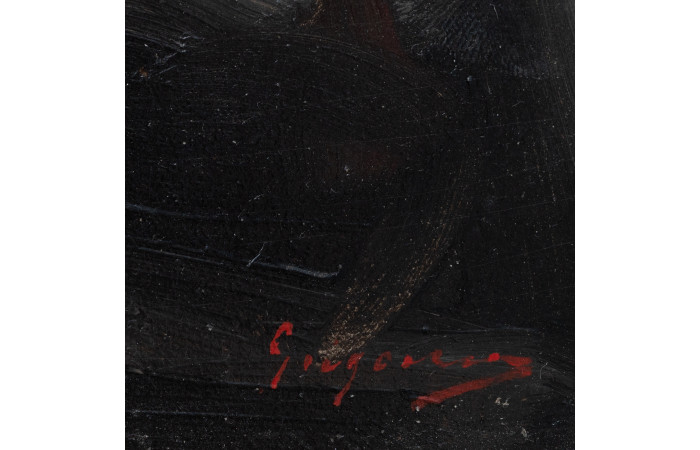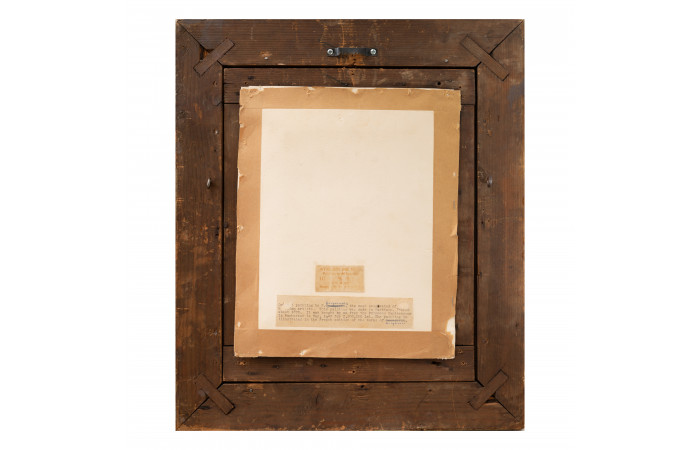The Portrait of Carlotta Leria (Portretul Carlottei Leria)
Description
Executed in: c. 1870
Medium: Oil on plywood
Size: 22 x 16 cm (50 x 42.5 cm with frame)
Signed lower right, in red, "Grigorescu"
Provenance
Collection Princess Cantacuzion, Maria- Rosetii Tescanu / Colecția Prințesa Cantacuzino, Maria Rosetti-Tescanu
Location
Bucharest
Description
The painter Nicolae Grigorescu is by far a symbol of Romania when it comes to art. As a Romanian interwar painter, he is definitely the best-known abroad. He is considered to be the master of all Romanian painters from that period and the one who created an important path in the history of Romanian art. Grigorescu was born into a large family with very modest financial resources. After his father’s death, he started selling his small painted landscapes at the village market to help his family. In 1843 he moved with his family to a peripheral neighbourhood of Bucharest. At the age of fourteen, after finishing two primary classes, Grigorescu wanted to go to Paris. Ambitious and hardworking, he applied for a scholarship, but unfortunately didn’t receive it.
Meanwhile, he started to paint religious paintings and one year later he became one of the most popular church painters. For many years, he painted churches in Romania and worked with the painter Anton Chladek. In 1861, his career as a church painter ended, given that he had acquired the financial resources to pursue his dream. He worked on his skills and enriched his visual culture by studying with great French artists, making an exquisite impression on Parisian critics with his talent. In Paris and Barbizon he created a series of remarkable works, both landscapes and portraits. Returning to Romania, Grigorescu had many successful exhibitions. In 1877, he was preparing to return to Paris when he received Brătianu’s call to go on the battlefield. After the war, Grigorescu built his studio in Câmpina where he lived and created for the rest of his life.
Nicolae Grigorescu was not a portraitist in the true sense of the word. He devoted his practice to nature and tradition; in this context the portrait appeared in his works. His characters are either surrounded by nature and animals, or found in postures dominated by expressiveness. His characters didn’t pose as the manner of his times would have required. The characters are a leitmotif to emphasise and express an emotion, a social class or to show the inner beauty of women adorned with traditional Romanian jewellery and clothing.
The work presented in the auction is considered exceptional, like other works such as “Lost Portrait” – which is part of the same series of portraits that now can be found in the collection of the Bucharest Municipal Museum. The painting refers to the femininity of the woman that Grigorescu loved passionately: soprano Carlotta Leria. Being fascinated by her rare beauty, he dedicated several portraits to Carlotta during his stay in Barbizon. The sensuality of this work lies in the depiction of the woman’s neck and back. In a seductive position, she gives the feeling that she is about to take off her elegant dress, leaving the viewer’s imagination to enter her privacy. A portrait from a technical point of view, this work can be translated as a close-up of an intimate feeling and the magical unforgettable love story.
Pictorul Nicolae Grigorescu este de departe o emblemă a României în ceea ce privește arta românească. Este fără îndoială cel mai cunoscut pictor interbelic român peste hotare și maestrul tuturor pictorilor români interbelici care au scris o importantă filă din istoria artei românești.
Grigorescu s-a născut într-o familie numeroasă și fără resurse financiare. După moartea tatălui a început să vândă în târgul din sat micile sale peisaje pentru a-și ajuta familia. În 1843 s-a mutat cu familia la București, într-un cartier mărginaș. Astfel, Grigorescu se trezește la paisprezece ani cu două clase primare terminate și un vis: să plece la Paris.
Ambițios și muncitor, a țintit către o bursă de studii, demers fără succes, însă. Între timp, a pictat icoane, iar un an mai târziu urma sa devină unul dintre cei mai căutați zugravi de biserici. Timp de mulți ani a pictat bisericile din România și a lucrat alături de pictorul Anton Chladek. În anul 1861 cariera de zugrav de biserici urma să se încheie, având în vedere că își procurase resursele necesare urmării visului.
La Paris și-a dezvoltat talentul, și-a îmbogățit cultura, studiind alături de marii artiști francezi și a uimit criticii parizieni cu talentul său. Tot aici, dar și la Barbizon, a realizat o serie de lucrări - peisaje și portrete - remarcabile. Întors în țară, Grigorescu a deschis numeroase expoziții încununate de succes. Avea să se întoarcă la Paris, unde, în anul 1877, îl și găsește chemarea lui Brătianu pentru a merge pe front. După război, Grigorescu și-a construit un atelier la Câmpina unde urma să rămână, să trăiască și să creeze pentru tot restul vieții.
Nicolae Grigorescu nu a fost un portretist, în adevăratul înțeles al cuvântului. El s-a dedicat naturii și tradiției; în acest context a apărut portretul în lucrările sale. Personajele sale sunt fie înconjurate de natură și animale, fie sunt realizate în posturi dominate de expresivitate. Personajele lui nu apar niciodată pozând, așa cum ar fi impus-o maniera vremurilor sale. Atunci când sunt reprezentate doar personaje, sunt mai curând un laitmotiv pentru a sublinia și exprima o stare, o clasă socială, o expresie sau pentru a arăta frumusețea interioară a femeilor împodobite cu bijuterii și straie tradiționale românești.
Lucrarea prezentată în licitație este excepțională și, probabil, asemenea lucrării cu titlul “Portret pierdut” - ce face parte din aceeași serie de portrete și care se află în patrimoniul Muzeului Municipiului București - este o aluzie la feminitatea persoanei pe care Grigorescu a iubit-o cu multă patimă: soprana Carlotta Leria. Carlottei i-a dedicat câteva portrete în timpul petrecut la Barbizon, fiind fascinat de frumusețea rară a acesteia. Senzualitatea acestei lucrări constă chiar în reprezentarea gâtului și a spatelui femeii. Descrisă într-o poziție seducătoare, aceasta oferă senzația că e pe cale să se dezgolească de rochia elegantă, lăsând loc imaginației privitorului de a pătrunde în intimitatea ei. Această lucrare reprezintă un portret din punct de vedere tehnic, însă mai degrabă este un prim-plan al unei senzații intime și a magiei unei povești de dragoste de neuitat.
The works of art which are subject to artist resale royalty rights ('droit de suite') are marked with an * in the description of the work of art. The amount of the royalties is calculated using a sliding scale of percentages of the Hammer Price.
Lots featured on Ans Azura’s platform may be subject to export regulations in the country where they are located and import regulations in the country where they will be shipped to. The location of each Lot is marked in its description.You are responsible for ensuring that you understand and comply with all relevant laws or regulations applicable in relation to the export or import of any Lot that you intend to purchase.
By registering to bid in auctions and by bidding on the Ans Azura platform you agree to the Bidder’s and Buyer’s Terms and Conditions which you may consult here. Please read these Terms and Conditions carefully. By bidding you accept personal liability to pay the Purchase Price consisting of the Hammer Price and the Buyer’s Premium plus the applicable Buyer's Expenses. Please note that the Total Cost Calculator will display the amount including the estimated Buyer’s Premium, exclusive of related artist resale royalties and any shipping expenses and all duties, taxes, VAT, and/or custom processing fees payable by the Buyer.





